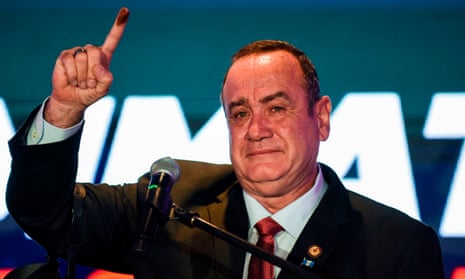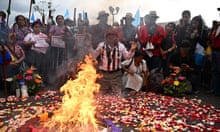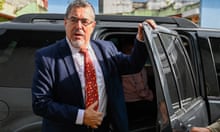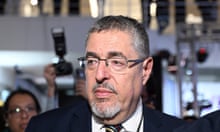A conservative law and order hardliner promising to reinstate the death penalty and deploy soldiers on to the streets has been elected the new president of Guatemala.
Alejandro Giammattei, 63, a former prisons chief backed by the country’s economic and military power brokers, trounced his opponent Sandra Torres, a former first lady, to win Sunday’s presidential race on his fourth attempt by securing 58% of the vote.
Despite the landslide victory, the low turnout triggered immediate questions about Giammattei’s legitimacy: about 60% of eligible voters abstained after both candidates failed to inspire hope in the Central American country, where tens of thousands of people flee extreme poverty, famine, violence and corruption every month.
Giammattei’s triumph comes amid growing tension with the US over migration and asylum. Shortly before his victory, Giammattei said he wanted to change a controversial migration deal signed with the US by his predecessor, Jimmy Morales.
More than 250,000 Guatemalans, mainly unaccompanied children and families, have been apprehended at the US border since October 2018 – compared with 115,722 in the previous 12 months. Giammattei says he will stop the exodus by prioritising anti-corruption, employment and security.

He has criticised the “safe third country” agreement signed by Donald Trump and Morales which, if enforced, would make migrants and refugees who have passed through Guatemala ineligible for protection in the US.
Instead, they would be deported to Guatemala which has been deemed a safe place to seek refugee. In 2018, the homicide rate in Guatemala was 22.4 per 100,000 people – four times higher than the US national average.
Guatemala is the most dangerous country in the world for environment and land defenders, with at least 16 killed in 2018 – up from three in 2017 – most of them indigenous Mayans, according to research by the UK anti-graft NGO Global Witness.
Giammattei says he will seek to modify the controversial pact, which was signed last month amid threats by Trump’s administration to block Guatemalan exports and impose tariffs on billions of dollars in remittances.
Details of the agreement remain murky, and currently face judicial and congressional obstacles in the US and Guatemala.
The president-elect must act now to stop the deal, according to the congresswoman Sandra Morán. “We’ve still not seen any documents, only what’s been in the press, so it’s an agreement which right now cannot be actioned. Trump will keep insisting, so Giammattei and his transition team must get involved now.”
It’s unclear how Guatemala would cope with an influx of desperate people from El Salvador, Honduras and beyond, given that it is the poorest country in Central America where 47% of children are chronically malnourished.
The migrant exodus is predominantly from rural regions where Guatemala’s 24 indigenous communities battle against dire economic, social and environmental conditions fuelled by land inequalities, racism and the climate crisis.
Indigenous people comprise almost half of Guatemala’s 17m population, but have the lowest access to healthcare, land, housing, education and jobs, and little political and economic power. Figures show around 80% of indigenous people live in poverty, 40% in extreme poverty, with malnourishment rates rising to over 70% in some communities.
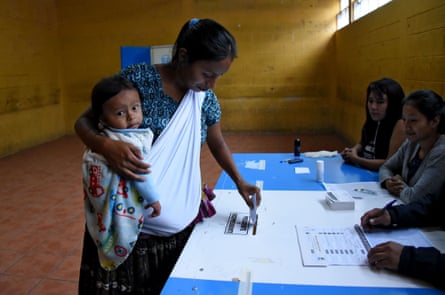
“Local and international experts agree that the main issue to tackle in Guatemala is extreme poverty … instead, Giammattei is promising austerity, harsher anti-terrorism laws, repression of poor and indigenous communities, militarisation and the death penalty,” said Renata Avila, a human rights lawyer and director of Fundación Ciudadanía Inteligente, an NGO focused on increasing citizen participation in Latin America. “In a country where the median age is 22 years old, the obvious decision for many will be to migrate.”
During his campaign, Giammattei – who was charged, jailed and then cleared over numerous extrajudicial killings during his time as director of prisons – pledged to fight corruption.
Yet Giammattei is backed by the same powerful network of elites who helped Morales orchestrate the demise of the UN-backed International Commission against Impunity (Cicig). Morales, who was elected in 2015 on an anti-corruption platform, defied court orders and public opinion to oust the international crime fighting force after corruption investigations targeted him, his family and his political backers.
On Sunday, Giammattei confirmed that he will not renew Cicig’s mandate, which ends next month.
“Giammattei’s victory is a huge blow to the fight against corruption and impunity. He rejects Cicig and a strong justice system, so we’re going back to a time when extrajudicial killings were committed with impunity,” said Jorge Santos, general coordinator of Udefegua, an NGO which documents crimes against human rights defenders.
Giammattei will be sworn in for a four-year term in January 2020.
